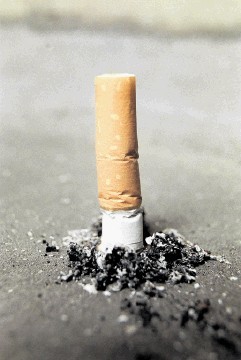
MOST of us by now know that smoking is bad for us and is linked to serious ill health. Just in case anyone is in any doubt, here’s some facts and figures that back this up.
o Each year 100,000 people in the UK are known to die due to smoking.
o The life expectancy of a long-term smoker is, on average, about 10 years less than a non-smoker.
o About 86% of lung cancer deaths in the UK are caused by tobacco smoking.
When inhaling tobacco smoke into your lungs, carbon monoxide and nicotine pass into your blood. Carbon monoxide increases the fatty deposits on the walls of the blood vessels increasing risks in strokes, heart disease and circulatory problems.
The tar is deposited in your airways and air sacs in your lungs where it begins to build up. Tar causes coughs, chest infections and may eventually lead to cancer.
When a person inhales tobacco smoke, nicotine is absorbed by the lungs and moves into the bloodstream to reach the brain within just eight seconds.
Each cigarette contains around 10 milligrams of nicotine and nicotine increases heart rate and blood pressure immediately.
We need to remember that nicotine is a powerful drug that stimulates the brain. If you are a regular smoker, you will come to rely on nicotine and, when the blood level of nicotine falls, you are likely to develop withdrawal symptoms which apart from that horrible feeling of craving a cigarette can include: anxiety, restlessness, headaches, irritability, hunger, difficulty with concentration and feeling generally under par.
These symptoms are relieved by the next cigarette which provides a hit of nicotine.
Here’s just a few of the ways that smoking damages the body.
o Smoking narrows the blood vessels, leading to oxygen-poor blood and high blood pressure.
o Smoking also increases ‘bad’ cholesterol resulting in levels of cholesterol increasing over time.
o Cigarette smoke contains over 4,000 chemicals, at least 50 of which cause cancer.
Now that we’ve well and truly established that smoking is bad for you, here’s some good news: some offshore medics have recently been targeting the staff on their rigs or installations and offering them support if they wish to try and give up smoking.
The medics were happy to provide their colleagues with replacement therapy patches and give advice and encouragement as the nicotine dose in the patches was gradually reduced.
Obviously, offshore rigs are dangerous places to smoke and it is strictly forbidden except in designated areas. However, if you are considering giving up smoking then the time you spend working offshore is an ideal window of opportunity, as you won’t be distracted and tempted by socialising with friends and family who may smoke.
The medics involved were delighted with the response to their offer of smoking cessation support and needed to order in extra supplies of nicotine patches to cope with the demand.
For busy offshore workers using lozenges or inhalers is just not practical. Nicotine patches are ideal as they are easy to apply and once in place will work continuously all day.
The medics are hoping that those who are managing successfully not to smoke offshore will also conquer the addiction once they are back onshore, and will be able to resist the easy access to cigarettes and places to smoke.
They are happy to give advice about the best ways to continue with a smoking cessation programme. Using nicotine replacement therapy helps the nicotine cravings to gradually pass, and then with encouragement and distractions it is much easier to overcome the mental side of the habit.
If you are an offshore worker and are considering giving up smoking, why not have a word with your medic and find out more about how to get started.
Within one year of giving up smoking your excess risk of heart disease will be half that of a smoker, and the risk of heart attack falls to about half that of a smoker.
Within 10 years the risk of developing lung cancer again is half that of a smoker.
It makes good sense, especially when you have a medic on hand to support you.
If you are still hooked on cigarettes, why not give it a try; it’s never too late to benefit from giving up smoking.
o Kelly Patterson is an occupational health adviser at offshore occupational health specialist Abermed